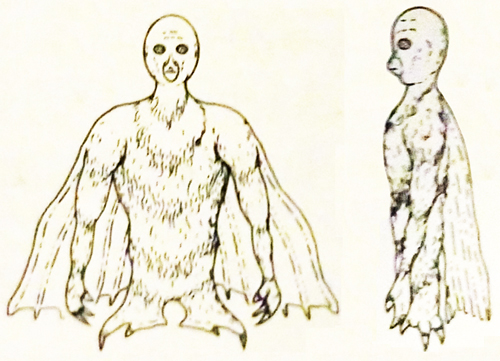Difference between revisions of "2141 (FASA)"
From Trekipedia
(Created page with "<div align="center" style="width:99%;"> <div class="HeaderRow ButtonLeftCorners" style="display:inline;width:33%;">Prev: 2140</div> <div class="Heade...") |
m |
||
| (6 intermediate revisions by the same user not shown) | |||
| Line 1: | Line 1: | ||
| − | + | {{ChronologyLinks|chron=FASA|year1=2140|year2=2142}} | |
| − | + | {{BannerFASA|tl|100%}} | |
| − | + | <div style="text-align:center;">'''[[Reference Stardate]] 1/4101 through 1/4112'''</div> | |
| − | |||
| − | |||
| − | |||
| − | <div style="text-align:center;">'''[[ | ||
==April== | ==April== | ||
| − | * RSD 1/4104: Intelligent flying humanoids, the [[Canaris | + | {{ImageBox2|file=canaris-sfc.jpg|caption=[[Canaris (FASA)|Canaris]] ([[Star Trek: Spaceflight Chronology (Book)|SFC]])}} |
| + | * '''RSD 1/4104:''' Intelligent flying humanoids, the [[Canaris (FASA)|Canaris]] are discovered on [[Alpha Virginis II (FASA)|Alpha Virginis II]], a planet located in [[Sector 14C (FASA)|Sector 14C]],<ref name="FASA2011"/> by the [[Placido class (FASA)|''Placido'' class]] [[U.S.S. Icarus II (FASA)|U.S.S. ''Icarus II'']], commanded by [[Star Fleet Ranks (FASA)#Captain|Captain]] [[Oonlarger, Jan (FASA)|Jan Oonlarger]]. Medical officer [[Freitag, Jose (FASA)|Jose Freitag]] noted in his log that "this species does not have any great natural enemies and consequently have no innate fear response. The Canaris ... exhibit all the '[[Humans (FASA)|human]]' emotions of love, gratitude, compassion and kindness, without the negative counterparts of hate, aggression, or scorn of indifference."<ref name="SFC"/> | ||
==December== | ==December== | ||
| − | * RSD 1/4112: Several [[Orions (FASA)|Orion]] families open up free ports and trade worlds, which have no regulations or tariffs to control trade. The first experiments are a huge success, with the Orion traders more than recouping their development costs by leasing commercial space and by setting up elaborate trade brokerage houses. Later experiments, however, are not as successful.<ref name=" | + | * '''RSD 1/4112:''' Several [[Orions (FASA)|Orion]] families open up free ports and trade worlds, which have no regulations or tariffs to control trade. The first experiments are a huge success, with the Orion traders more than recouping their development costs by leasing commercial space and by setting up elaborate trade brokerage houses. Later experiments, however, are not as successful.<ref name="FASA2008A"/> |
| − | |||
| − | |||
| − | |||
| − | |||
| − | |||
| − | |||
| − | ==References | + | {{ChronologyLinks|chron=FASA|year1=2140|year2=2142}} |
| + | {{References}} | ||
<references> | <references> | ||
| − | <ref name="SFC"> | + | <ref name="SFC">{{RefSFC}}</ref> |
| − | <ref name="FASA2011"> | + | <ref name="FASA2011">{{RefFASA2011}}</ref> |
| − | <ref name="FASA2008A"> | + | <ref name="FASA2008A">{{RefFASA2008A}}</ref> |
</references> | </references> | ||
| + | [[Category:Chronology]] | ||
| + | [[Category:FASA Timeline]] | ||
Latest revision as of 05:05, 26 February 2023
Reference Stardate 1/4101 through 1/4112
April
- RSD 1/4104: Intelligent flying humanoids, the Canaris are discovered on Alpha Virginis II, a planet located in Sector 14C,[1] by the Placido class U.S.S. Icarus II, commanded by Captain Jan Oonlarger. Medical officer Jose Freitag noted in his log that "this species does not have any great natural enemies and consequently have no innate fear response. The Canaris ... exhibit all the 'human' emotions of love, gratitude, compassion and kindness, without the negative counterparts of hate, aggression, or scorn of indifference."[2]
December
- RSD 1/4112: Several Orion families open up free ports and trade worlds, which have no regulations or tariffs to control trade. The first experiments are a huge success, with the Orion traders more than recouping their development costs by leasing commercial space and by setting up elaborate trade brokerage houses. Later experiments, however, are not as successful.[3]
Notes and References
- ↑ Menke, Bernard Edward and Rick David Stuart (Authors). The Federation. Star Trek: The Role Playing Game. Book 2011. Cover art by David R. Deitrick. Illustrations by Todd F. Marsh, John C. Tylk, Bob Eggleton, Daniel E. Carroll, and Jay Harris. FASA Corporation. 1986.
- ↑ Goldstein, Stan et al (Authors). Spaceflight Chronology. Star Trek. Book. Wallaby Books. 1980.
- ↑ Rogan, Peter R. (Author). The Orions: The Book of Common Knowledge. Star Trek: The Role Playing Game. Book 2008 . Cover art by David R. Deitrick. Illustrations by Jane Bigos, Dana Knutson, Todd Marsh, and Jim Nelson. FASA Corporation. 1987.
